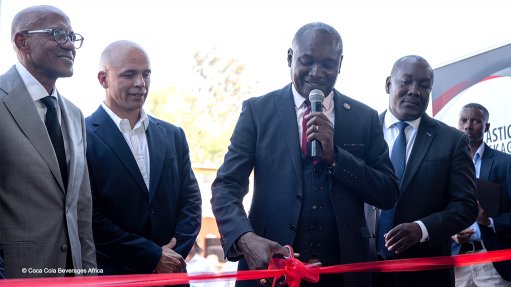
Namibian Environment, Forestry and Tourism Minister Pohamba Shifeta officially opens the new $1.2-million plastic flaking plant in Okhanja
Photo by: Coca Cola Beverages Africa
An investment of more than $1.2-million through a partnership between Coca-Cola Beverages Africa (CCBA) and plastic packaging company Plastic Packaging has culminated in the opening of a new polyethylene terephthalate (PET) flaking plant in Okahandja, Namibia.
The plant is expected to double the capacity of the only mechanical recycler of plastic waste in the country.
Namibia Polymer Recyclers, a subsidiary of Plastic Packaging, is set to upscale its recycling capacity to handle up to 500 t a month with the completion of the plant.
“The Coca-Cola system aims to drive systemic change through a circular economy for packaging. We are leading the industry to help collect and recycle a bottle or can for every one we sell by 2030,” said CCBA chief public affairs, communication and sustainability officer Tshidi Ramogase.
“We have a responsibility to help solve complex plastic waste challenges facing our planet and society, and we’re leveraging our scale and reach to achieve our sustainability goals and reduce packaging waste.”
Highlighting the collaborative effort involved in establishing a circular economy, Ramogase underscored the environmental and economic benefits of recycling, emphasising its potential to generate employment and empower the informal waste collection sector.
“Unlike a traditional linear economy in which packaging is made, used and disposed of; a circular economy preserves the economic value of packaging through robust collection and recycling systems,” Ramogase added.
The recycling plant specialises in transforming discarded beverage bottles made from PET material into PET flakes with an international market value. The flaking process involves sorting, shredding, hot-washing and drying of flakes, culminating in the production of recycled PET pellets and other end-uses.
By reducing reliance on virgin PET and diverting waste from landfills, the facility plans a key role in environmental conservation.
Ramogase further elaborated on CCBA’s commitment to sustainable practices, citing ongoing investments in infrastructure to bolster recycled PET capacity across its operational regions.
“These investments not only provide a source of recycled content for our packaging, but also create additional demand for empty packages, driving increased collection.”
“At CCBA, we are a proud industry leader in developing increasingly sustainable ways to produce, distribute and sell our products. We use our industry leadership to be part of the solution to achieve positive change and to build a more sustainable future for our planet,” said Ramogase.